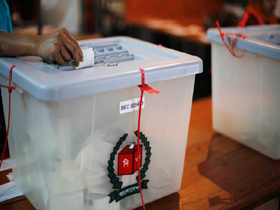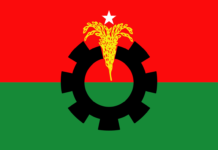Faruque Ahmed
The Upazila Election, hastily organized by the government has turned out to be a boomerang for the ruling party instead of helping it to reestablish control in the countryside. The dismaying results reflected the ruling party and its local leadership’s isolation with the voters.
In the first phase of the election held on February 19 in 98 upazilas, BNP backed candidates won the post of chairman in 44 upazilas while ruling party Awami League and Jamaat-supported candidates took 34 and 12 Upazilas respectively. During the second phase on February 27 BNP-led candidates bagged 51 posts of chairman, Awami League 43 and Jamaat 8 posts respectively. Both BNP and Jamaat claim that they could bag some more seats if the EC were neutral and able to enforce law and prevent vote rigging and snatching of ballot boxes by the ruling party goons.
JP’s visibility nil
The interesting part in this election is that the Jatiya Party has failed to show a visible presence across the country as a political force so far, except winning one chairman’s post in the second phase.
The party altogether disappeared from the scene though it has won 34 seats in parliament in January 5 election proving that it was a totally farcical game under a voter-less seat sharing arrangement with the government.
Moreover, all other left parties and splinter groups which the ruling Awami League has assembled to name it as the 14-party grand alliance also failed even to field any independent candidate to UZ polls to prove that that they have any grassroots support behind them. They simply worked under the cover of the ruling party and get its candidates winning the polls.
The results moreover proved quite damaging for Awami League if one takes into consideration the winners list of vice presidents. A tally of the results showed candidates backed by Jamaat won 34 posts of vice presidents in the second phase which is the highest largest number of male vice presidents leaving behind both BNP and Awami League individually.
A total tally moreover showed that BNP backed candidates won 64 posts of male vice presidents followed by 60 posts won by Awami League candidates and 58 by Jamaat candidates. Likewise, a total of 85 posts of female vice presidents so far went to BNP candidates, followed by 76 to Awami League and 27 to Jamaat. The results so far obviously suggest that Jamaat has a considerable support base at the rural areas though the government wants to ban it as a terrorist organization. The result has not only reaffirmed its popular support base while the entire international community is apparently not in agreement with the government claim that Jamaat is a terrorist party, though its’ a religion-based party.
Jamaat’s strength confirmed
Now the UZ election has re-established its strength once again under a most adverse conditions and it may be difficult now to eliminate Jamaat from politics while the results have given a signal to the government to put a stop erosion of its popularity and rethink whatever it was doing things for its own good.
The slide in the government’s political base became visible for quite some time. It lost all four city corporations elections late last year although it hastily arranged to win the national polls in a voter-less one-sided elections by way of a trickery brinkmanship.
The BNP led opposition boycotted the January 5 polls blaming too much politicization of the administration and a partisan Election Commission are not conducive for a free and fair election. They demanded election under a neutral caretaker government and the government ignored it and returned to power after a one-sided election.
This time the ruling party hastily organized the UZ election to re-establish its control over the countryside believing that the opposition may continue boycotting the polls allowing the ruling party a free passage. It proved otherwise.
DCC polls uncertain
It was announced at the time of announcing the UZ elections that the two Dhaka City Corporation elections would follow this election. It now appears quite unlikely that the government will hold it and truly enough one Election Commissioner on Thursday made it clear that boundary will not allow it to happen. The basic question is that the probability theory is not working with the government since its acceptability to the voters is at its lowest at the moment.
In fact, any bid to win power by playing foul and bypassing the democratic practice is bound to prove counter-productive. The government has rather snatched the parliamentary polls scrapping the caretaker government to allow Prime Minister Sheikh Hasina to hold the polls under her own supervision. This is how she won the last national election, although it lacked legitimacy to people at home and to the international community.
The opposition is now reorganizing itself and would try once again to force the government to hold a free and fair election under a caretaker government. Meanwhile, the government move to keep the opposition busy with local government elections may be giving the ruling party the needed breathing space.
But it has further isolating itself from the people by exposing its low support base for wrong policies and actions while bringing unexpected victories to the opposition even in highly hostile political environment. Jamaat has won the most out of this election in terms of regaining confidence and consolidation of its party base to rural voters.
It appears that the government is losing patience in the face of steadily losing political grounds. Retorting to BNP chairperson Begum Khaleda Zia’s call for fresh agitation to realize the parliamentary election under a caretaker government, senior Awami League leader the PM’s first cousin Fazlul Karim Salim warned that anybody who would resort to violent political activities against the government will see his or her hands and legs cut off.
The threat has stunned the country’s political observers. Most people tend to believe that it can’t be the language of a senior political leader. They asked for patience saying when one is standing on quick sand or drowning in the sea only then one may speak in that guttural language.
We believe politics must bring peace and stability and shun violence. The government and the opposition must work together having the belief that people behold the ultimate power to bring change.
Source: Weekly Holiday









